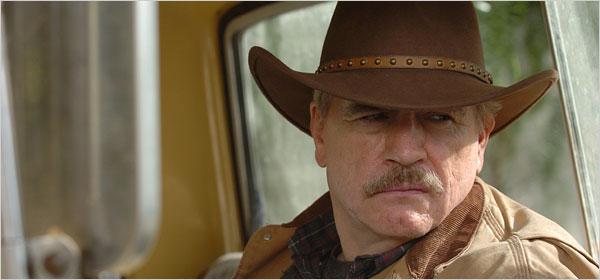
Red (Movie Review)
I don’t really read horror fiction. There are probably several reasons for this but I am going to blame Dostoyevsky, or more correctly an uncle of mine who felt it would be good for me to read “Crime and Punishment” at far too tender an age. At 11 years old, I could appreciate none of the heavier subtext of the book nor really understand the world in which it took place. What I could take in and be horrified by was the description of the peasant man whipping his horse to death. I found this monumentally unsettling. To this day I carry the image formed by my brain with me and can conjure it instantly when Dostoyevsky’s name is mentioned.
None of the horror movies I had seen to that point had nearly the effect on me that reading that small passage did. If like me, you read that interaction of man and beast at an age when you would have been better off with “The Black Stallion Returns” then you can probably imagine why the prose of Stephen King, Clive Barker et al. have little or no impact on me. Likewise, Jack Ketchum has never been fascinating to me, though I have had his books recommended by friends. Everything I know of the man’s work I have learned from the film adaptations. “Red” is the latest in his catalog to make its way to onto my television screen.
“Red” follows Avery “Av” Ludlow, a widower, store owner and ex-military man in his sixties. His only companion is an old mutt named Red who was a gift from his dead wife on his fiftieth birthday. The two are inseparable and spend a good deal of time sitting beside the lake at Miller’s Bend reeling in fish. On one such morning Av and Red are visited by three teen boys; Danny and Harold McCormack and their friend Pete Doust. Danny is with shotgun and asks Av for money, which the old man says is in his truck. When Danny is unsatisfied with the exchange he shoots Red. Danny and Pete laugh about it but Harold is deeply troubled by his brother’s actions. The boys leave and Av goes home and buries Red in the yard.
Av runs down the names of the boys and goes to the McCormack house to confront their father Michael about the incident. Michael, a wealthy but crooked businessman refuses to accept the story and sends him on his way. Av appeals to his attorney friend to make a case against the boys but the case hits a dead end when Michael McCormack starts to flex his financial muscle. Av and his attorney then enlist the aid of a local television reporter who does a personal interest story on the events. Unfortunately Michael McCormack’s reach manages to quash that avenue for justice as well.
Ludlow’s luck goes from bad to worse when his pursuit of the boys results in the anonymous torching of his General Store. Michael McCormack dares him to take action and in the final act that dare becomes too much for Av Ludlow to bear up against. Ludlow sets his eye on justice and goes to the McCormack cabin to try and extract it from the Danny.
There is a lot of outstanding stuff here, most of it built on the best foundation of all, great performances. Brian Cox peels off the layers of Av Ludlow at just the right pace and keeps his character likable even though he is making tragic missteps throughout. Tom Sizemore is indelible as a smug, nouveau riche redneck and Noel Fisher is downright despicable as his dog-killing son Danny. Kim Dickens, Kyle Gallner, Amanda Plummer and Robert Englund all do nice supporting work here as well.
The cinematography and direction are tight even if at times the work is less than inventive. Reportedly Lucky McKee was asked to leave the project just prior to the end of principal photography. He and the production company remain tight-lipped as to the reasons why, so shedding light on what falls to him and what was the work of his replacement Trygve Allister Diesen is difficult.
Whatever the breakdown “Red” has Mckee’s stamp throughout. The theater featured in the film is playing the short “Burro Boy” which was also featured in “Roman”, a film directed by Angela Bettis that Mckee starred in. Also the story takes place near a town called Jenny Lind, which was McKee’s birthplace. In addition to this, the film is very deliberate in its pacing. While not necessarily a trademark of Lucky Mckee’s work, the man does handle a less than frenetic pace better than many current horror/thriller directors.
“Red” is a slow burn revenge tale that is built on a heavy dramatic backbone. The movie starts with a Family Channel vibe but soon morphs into a downbeat portrait of a haunted man. The themes are what I have come to expect from Jack Ketchum screen adaptations. The biggest moral clashes in “Red” are those of material and spiritual value systems; the litigious versus the just, and fealty versus deeper loyalty. What I like about Ketchum’s work (or at least what I can tell from the film versions) is that the resolutions don’t supply a pat ending. While “Red” has a more optimistic endpoint than “The Lost” or “The Girl Next Door”, there is still enough collateral damage and unanswered questions to leave the viewer with a palpable sense of loss.
Maybe the biggest compliment I can pay the film is that it makes me want to investigate the source material. The filmmakers have done a very good job of telling the story and tantalizing the viewer with bigger philosophical questions without trying to fix opinion too firmly. In short, this story of dead dog might actually inspire me to stop beating Dostoyevsky’s dead horse and pick up a Jack Ketchum novel.

